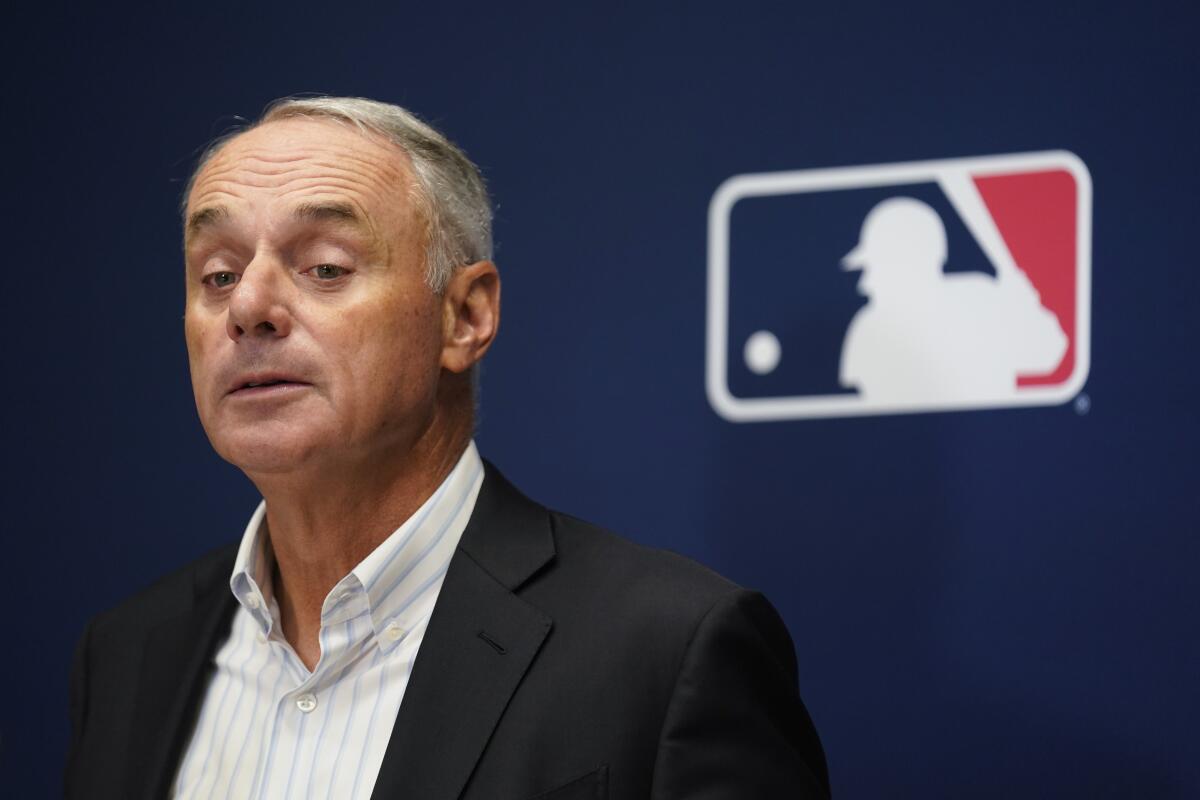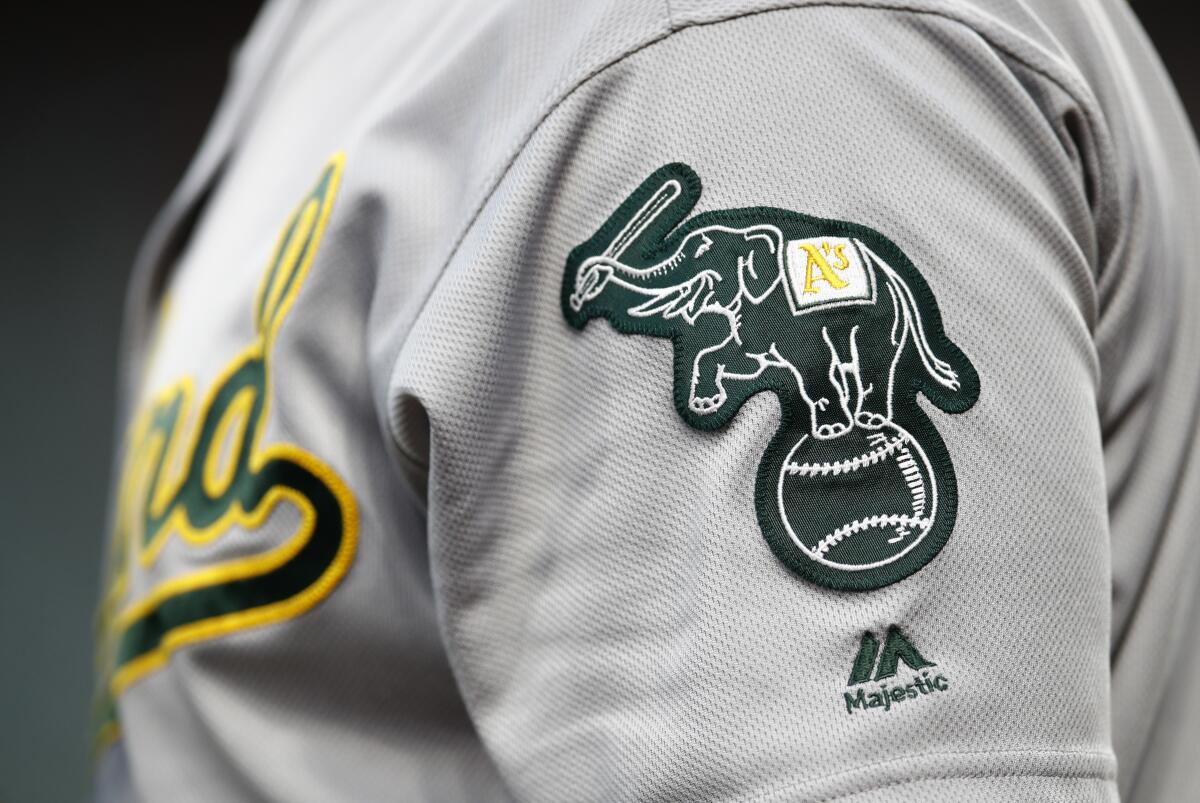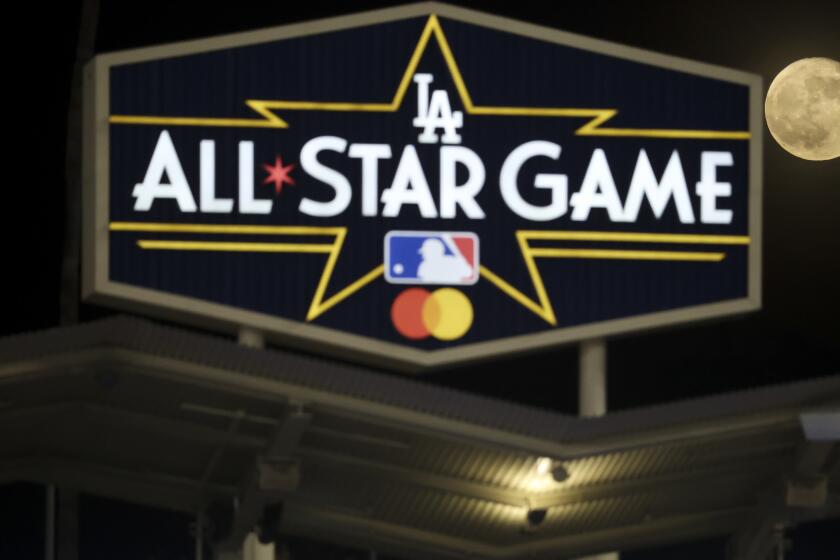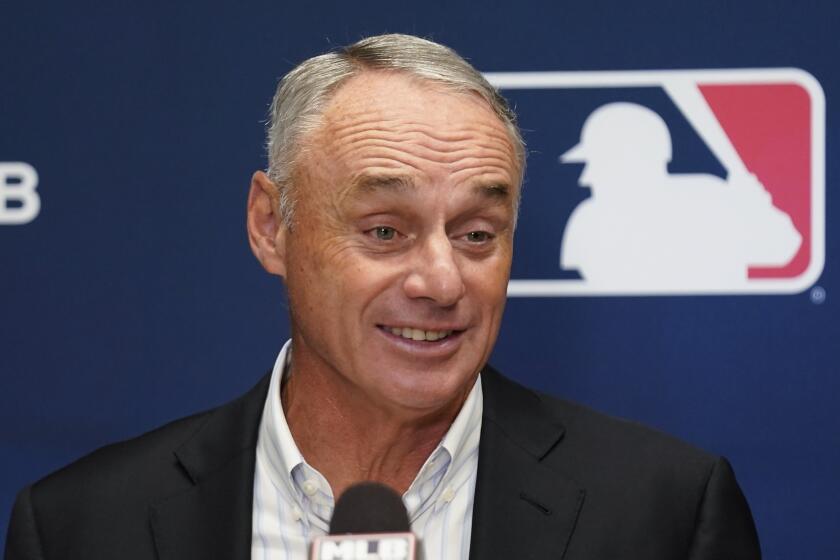Rob Manfred says MLB antitrust exemption has one ‘meaningful’ use. Here’s what it is

- Share via
NEW YORK — To baseball fans across America, the time-honored cry of summer is this: Kill the ump!
To legislators in Washington, the time-honored cry of summer is this: Kill the antitrust exemption!
Your eyes might glaze over at the words “antitrust exemption,” but bear with me for a moment.
For 100 years, Major League Baseball has been exempt from a law that the Department of Justice says “outlaws all contracts, combinations, and conspiracies that unreasonably restrain” competition among businesses. Since then, congressmen have criticized baseball for whatever the grievance of the moment might be, threatened to revoke the exemption and attracted the publicity that a sports-related issue delivers to Capitol Hill.
The exemption survives. This summer, however, the exemption is under unprecedented attack from all three branches of government.
The current Supreme Court, which has loosened itself from what previously has been considered binding legal precedent, has all but invited a challenge to baseball’s antitrust exemption. The Department of Justice has urged a federal court to limit the exemption. The Senate is considering legislation that would end the exemption entirely.
I met with MLB Commissioner Rob Manfred the other day, and I asked him to explain the issue to the common fan: What is this exemption, and why do you need it?
“It’s really interesting,” Manfred said. “The principal utility of the exemption is it allows us to be more aggressive than other leagues in terms of preventing franchise relocation. It is a fan-friendly doctrine in the law.”
He is right about that. In the last half-century, one MLB team has moved, and even that move came with an asterisk: When the Expos moved from Montreal to Washington, MLB owned the team.
In that same half-century, the Raiders alone moved from Oakland to Los Angeles, back to Oakland, and then to Las Vegas. When the NFL tried to stop the Raiders, the courts sided with the Raiders, who were acting in what they believed were the best interests of their business.
When the Oakland Athletics tried to move to San Jose, acting in what they believed were the best interests of their business, the courts deferred to MLB, citing the exemption. The San Francisco Giants had the league’s territorial rights to San Jose, and that was that.
But, in the context of this summer, perhaps Manfred might have offered a potential resolution.

With the Senate Judiciary Committee sending the kind of information request that often precedes a Congressional hearing, perhaps Manfred and baseball’s owners could avoid the prospect of Congress or the Supreme Court imposing a resolution by offering to limit the exemption to franchise relocation.
“I can’t think of a place where the exemption is really meaningful, other than franchise relocation, right now,” Manfred said.
The Curt Flood Act, signed into law in 1998, gave major league players the right to sue for antitrust violations, although the players’ union would have to disband for players to exercise that right.
“Labor is the other big antitrust issue,” Manfred said, “and we’re just like every other sport. That’s what the Curt Flood Act did. ... The understanding, at the time that was passed, was that we were going to preserve the franchise relocation benefits that existed in the exemption.”
The Senate Judiciary Committee asked for information from Advocates for Minor Leaguers, an organization that considers the exemption as the reason why major league teams can control minor leaguers for as long as seven years and agree on a minor league pay scale.
Manfred said he does not believe minor league pay is limited by the exemption.
Dodger Stadium is a distinctly wonderful place to watch a baseball game, but a most difficult place to attend a baseball game.
“I really don’t,” he said. “We have made tremendous improvements in wages, hours and working conditions in minor league baseball in recent years. We pay more. The working conditions are vastly improved. Travel is less. Training facilities are better. And 90% of minor leaguers receive housing.
“The other thing to bear in mind is that minor league baseball exists as the result of hundreds of millions of dollars of subsidies from Major League Baseball.”
How would Manfred explain to the common fan why the salary for a triple-A player starts at about $14,000 a year, when the salary for a player at the highest level of hockey’s minor leagues starts at $52,000?
“First of all, it’s a much larger minor league system than it is in hockey,” Manfred said. “We support a lot more teams, and a lot more players. And those salary numbers are misleading. Most of those players received a signing bonus on the way in to professional baseball, so that their true earnings are something different than that salary figure.”
NHL teams generally have two minor league affiliates. MLB teams have four minor league affiliates, plus additional teams based at training complexes in Arizona, Florida and Latin America.
In a wide-ranging interview, MLB Commissioner Rob Manfred talks about baseball’s biggest issues, including the Angel Stadium saga and rising costs for fans.
The baseball draft covers 20 rounds. The recommended bonuses are above $1 million for players selected in the first two rounds, above $250,000 for players selected in the first six rounds and above $149,000 for players selected in the first 10 rounds.
The minor league hockey players are represented by a union. The minor league baseball players are not.
Without the exemption, the league could face challenges beyond the minor league contract structure, in areas such as broadcasting and merchandising rights.
However, if Manfred believes franchise relocation is the only “really meaningful” application of the antitrust exemption, it would be no surprise if Congress asks MLB to agree to limit the exemption to franchise relocation.
If the Senate Judiciary Committee invites Manfred to testify, that might be the first question — and a potential resolution to the three-pronged attack on the exemption. The question, and the answer, all in one.
More to Read
Go beyond the scoreboard
Get the latest on L.A.'s teams in the daily Sports Report newsletter.
You may occasionally receive promotional content from the Los Angeles Times.














